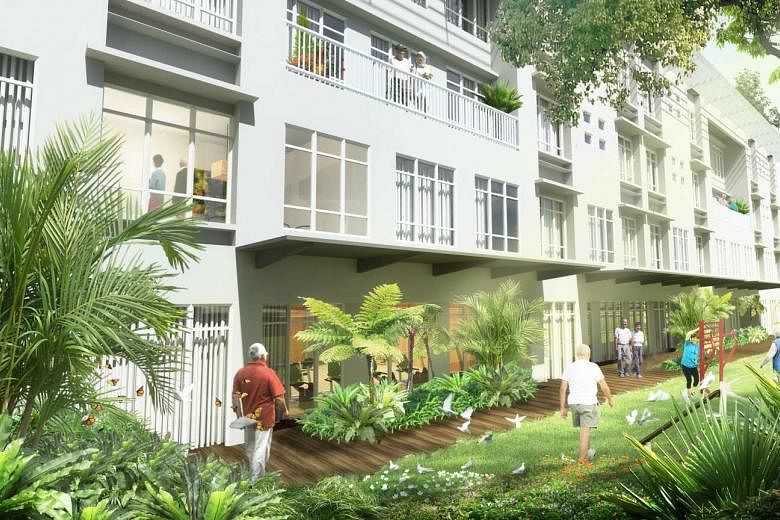Plans for a $15 million nursing home have been aborted after it failed to secure government subsidies.
Work on Jade Circle, a four-storey building next to the Salvation Army's Peacehaven home in Changi, was supposed to start this year.
The project, developed jointly by Peacehaven, the Lien Foundation and Khoo Chwee Neo Foundation, hoped to pioneer a different model of care for dementia patients by doing away with the usual six- to eight-bed hospital ward layout common in nursing homes here, and instead provide single or twin rooms with en suite toilets.
Each small group of 12 residents would also have its own dining area and kitchen. Such a design is meant to create a home-like environment and provide the residents with more privacy, autonomy and well- being, said Peacehaven.
The foundations had intended to commit $10 million to the project and the home was meant for both full-paying and subsidised patients who are mobile, with moderate to severe dementia. Fees before means testing and subsidies were estimated at $2,800 to $3,500 a month.
Though the project was announced by the funders in February, the Ministry of Health (MOH) told Peacehaven last month that it could not provide subsidies to residents staying in such rooms.
In response to queries, the MOH said: "As a matter of policy, it will be difficult for MOH to provide ongoing subsidies for patients staying in wards that are designed to proxy private or A-class ward configurations such as single or double-bedded rooms only. Such parameters will be hard to scale or to be financially sustainable, if applied to the rest of the aged care sector."
Unlike countries like Britain and Japan where the maximum number of people to a room is two, eight-bed rooms are the norm here. Single rooms are usually used for interim infection-control purposes.
The MOH suggested that Jade Circle convert more than half of the 60-bed facility to four-bed wards in order to enjoy the subsidy, said Peacehaven. However, this would add just four more beds, it added.
Lien Foundation chief executive Lee Poh Wah said: "Unfortunately, we are aborting the project because reconfiguring the number of beds to a ward-like setting goes entirely against our ethos and vision of a future nursing home that helps persons with dementia age with dignity regardless of their socio-economic standing.
"We can't use the same funding model for different care settings as patients stay only for days or weeks in hospitals, but those in nursing homes typically spend the remaining years of their lives there."
Peacehaven executive director Low Mui Lang said residents improved after some wards were converted to single and double rooms in Peacehaven in 2006. "They began taking pride in dressing up and initiating their own activities instead of being passive. Dementia patients also tend to get disoriented in a room with so many identical beds, or fight with their roommates due to the lack of personal space."
Research has shown that there are benefits to staying in private rooms, compared to shared ones. A British National Health Service study found that such residents suffer fewer infections and need less hospitalisation.
Dr Jeremy Lim, a partner in global consulting firm Oliver Wyman and former senior official at MOH, said: "Superficially, it may appear as if bureaucracy is rearing its ugly head and trying to force-fit innovative models into existing funding frameworks. However, this issue may be the symptom of a larger and more fundamental divergence on what is considered medically necessary and what is considered a 'luxury' or a 'frill' and, therefore, what degree of 'creature comforts' would be appropriate for residents funded by government subsidies."
The MOH said it is prepared to consider extending to Jade Circle the portable subsidy scheme, where private homes can offer some of their capacity to subsidised patients if there is a need for the beds.
It said it will be meeting Peacehaven and its funders to discuss how they can work together to support the project and enable it to proceed.


